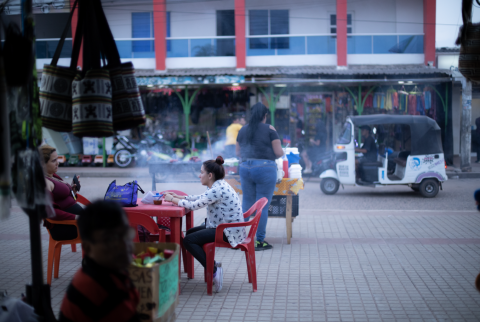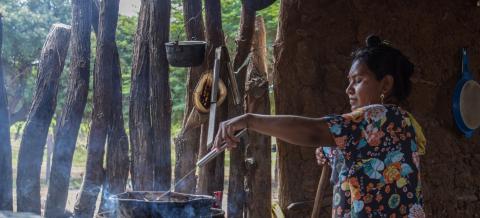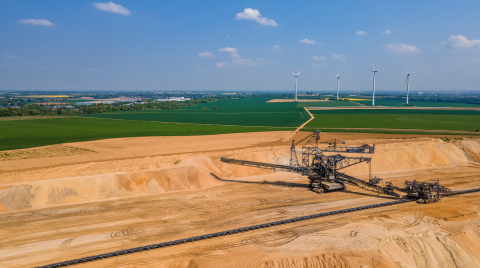
Communities at the crossroads: Engaging communities in a just energy transition
New report highlights opportunities and challenges for engaging communities in the transition to net zero
In a remote, arid town in the northernmost tip of Colombia, onshore wind farms line the coast. For residents of the La Guajira region, the signs of the global energy transition are stark: cargo ships are visible beyond the wind turbines, carrying coal from the nearby Cerrejón mine.
The region is also home to the indigenous Wayúu people, and wind farms have sprouted across their lands in recent years. The industry has brought benefits for the country, but its impacts on host communities remains contentious.
“Land tenure in the Wayúu social structure and negotiation with companies is a complex element that can create conflict between communities,” said a Wayúu pütchipü'ü, or traditional mediator. Another member of the community asserts that, despite the development of large electricity projects at their doorstep, families in the area don’t have electricity in their homes.

Further afield, in the coastal settlements of Ghana’s Ellembelle district, the nascent oil and gas industry has reshaped the community. Gas processing plants have brought jobs, economic opportunities, healthcare facilities, schools and roads. But the global shift away from fossil fuel brings uncertainties for the people of Ellembelle. “The only reliable source of revenue to finance critical public projects is the revenue received from the oil and gas companies,” said a local senior official. “How will we survive if these companies are not in operation?”
The only reliable source of revenue to finance critical public projects is the revenue received from the oil and gas companies.
The stories from Ellembelle and La Guajira provide a glimpse of the challenges and impacts faced by local communities near extractive and energy operations in the era of energy transition. Key to a just energy transition is ensuring communities can meaningfully participate in decisions impacting their lives. The unprecedented speed and scale of change unfolding in the energy and mining sector intensifies the need to pursue decarbonisation goals in a manner that respects communities’ rights.
To gain a better understanding of extractive and energy projects’ impacts and address the challenges related to accessing relevant information, the EITI initiated “Engaging communities in a just transition”, a two-year project supported by the Ford Foundation and implemented in four communities in Colombia, Ghana and Indonesia.
The project’s latest report highlights that although companies and governments have improved their practices and guidelines for consulting communities and conducting impact assessments, involving communities in decisions that shape extractive and energy projects remains a challenge. In many cases, communities lack the necessary information to participate effectively in decision-making.
Impacts on community livelihoods
Understanding the unique local context and the potential effects of a project is critical when designing and implementing energy and extractive projects. Yet community perspectives are often overlooked. In Indonesia, community members in North Morowali expressed concerns about water pollution from nickel mining affecting their livelihoods and fishing. In Cesar, Colombia, communities worry their priorities aren’t considered in mine closure plans.
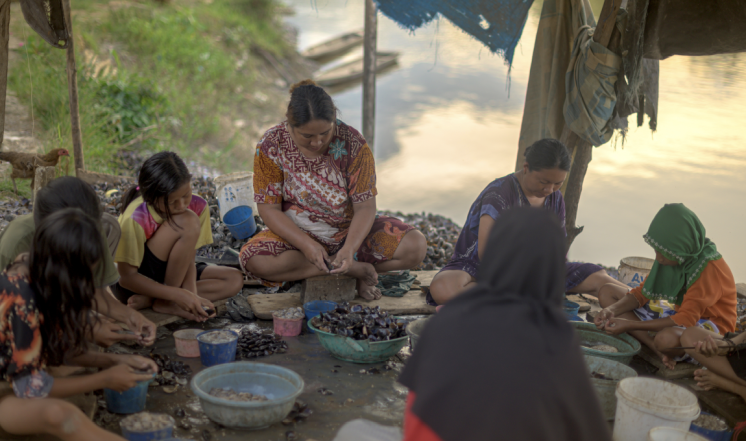
For these and other communities participating in the project, what matters most are the tangible ways in which the energy and mining sectors impact their livelihoods – economically, socially and environmentally. To align decisions with community needs, companies and governments should delve deeper into these issues, which in turn can foster more inclusive and sustainable solutions.
Uncertainty about the future
As the energy transition reshapes the energy and mining sectors, communities hosting energy and mining operations face uncertainty. Ghana’s National Energy Transition Framework includes natural gas in the domestic energy mix, but also acknowledges potential challenges tied to a global decline in oil and gas demand, which could affect employment, economic activity and government revenues. In Colombia, workers and community members shared concerns regarding a lack of information on closure and transition plans in view of anticipated declines in coal production. And in Indonesia, dissatisfaction with consultation processes for new nickel mines and processing facilities emerged as a pressing issue.
Detailed and timely information through EITI reporting on regional budgets, environmental and social impacts and broader economic contributions can enhance understanding of how mining, and energy operations affect local communities. Moreover, involving communities early in decision-making and amplifying their voice in national and global discussions fosters transparency, addresses concerns and promotes collaborative problem-solving. When engaged constructively, communities can significantly contribute to identifying solutions to the challenges that transitioning to a low-carbon economy can bring.
As the energy transition reshapes the energy and mining sectors, communities hosting energy and mining operations face uncertainty.
Making data available and accessible for decision making
Publicly disclosing information is crucial but insufficient without making it accessible, understandable and usable for communities. Factors such as literacy and limited access to electricity and technology affect the effectiveness of information formats, and detailed technical reports and complex data portals are often not suitable for communities’ needs.
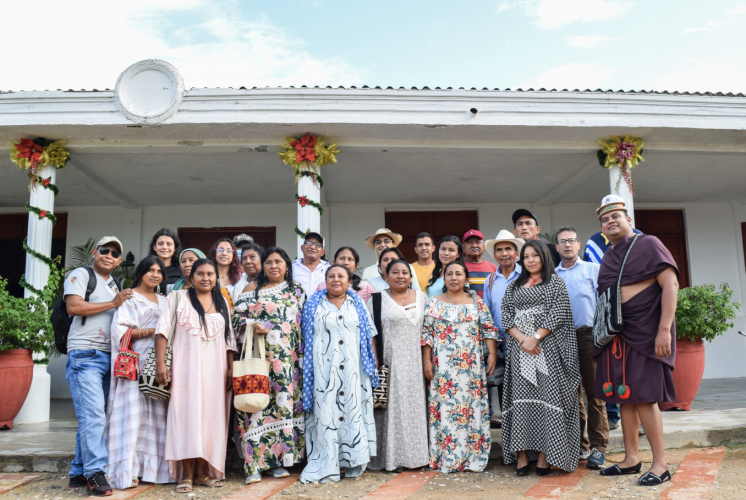
In two of the participating communities, information on extractive and energy projects is rarely available in their local languages. Communities suggested using local media channels for dissemination. In Ghana, community members favoured community forums, such as town hall meetings and local radio stations, to disseminate information. In Colombia, a mining company has even used theatrical performances to engage with communities.
Key recommendations for a just transition
The project report highlights several recommendations to make information more accessible for communities and for engaging them in decision-making. EITI multi-stakeholder groups can use the EITI Standard to delve into issues that matter most to communities – for instance on local employment, social spending, renewable energy projects and environmental and social impacts assessments – and present such data in user-friendly formats. Community participation in EITI multi-stakeholder groups or national policy dialogue can also help amplify community voices in decision-making. Finally, sustained engagement with affected communities requires regular touchpoints and proactive outreach to local spaces.
Publicly disclosing information is crucial but insufficient without making it accessible, understandable and usable for communities.
In the rapidly changing energy transition, greater inclusion of local knowledge and community perspectives are essential. This fosters understanding, trust and broader support, ensuring decisions respond to long-term challenges and opportunities. Community engagement is not an option; it’s essential for a just energy transition.
Engaging communities in a just transition
Download our report on using data and dialogue to engage communities in a just energy transition, based on findings from Colombia, Ghana and Indonesia.
